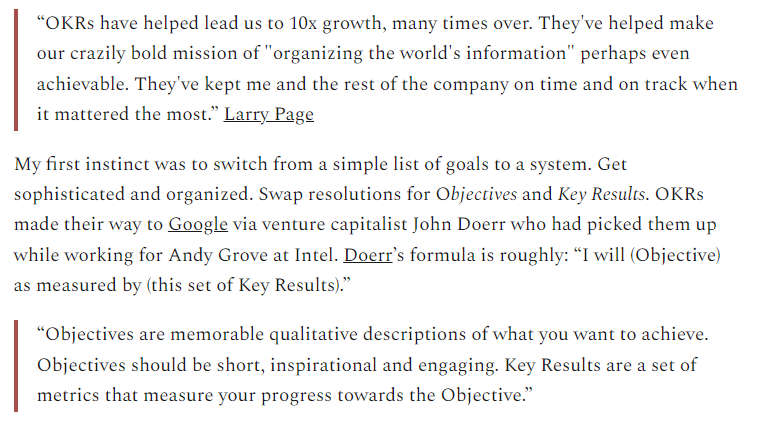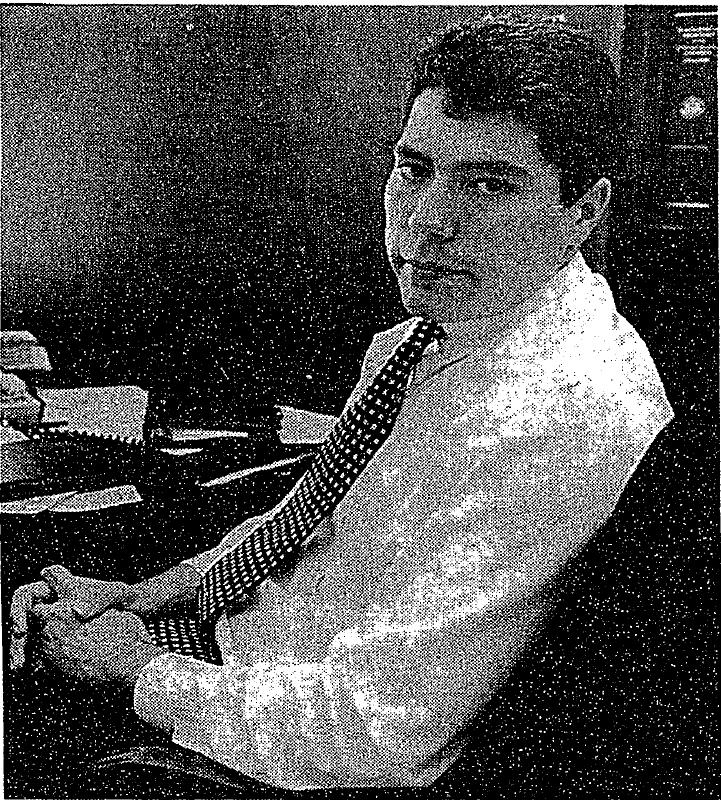
I get excited by the liminal space between the years. Anything seems possible with the blank canvas of 12 fresh months.
But it's a conundrum: I know from experience that long lists of goals don't work. They're quickly forgotten.
Instead, I combined several frameworks this year:
But it's a conundrum: I know from experience that long lists of goals don't work. They're quickly forgotten.
Instead, I combined several frameworks this year:
First I thought I'd get fancy. Forget goals and resolutions. We want Objectives and Key Results (aka OKRs). If it's good enough for Google...
This is John Doerr’s formula: “I will (Objective) as measured by (this set of Key Results).”


This is John Doerr’s formula: “I will (Objective) as measured by (this set of Key Results).”



You don’t have to reinvent the wheel here. Check out this template by @patriciamou_
docs.google.com/spreadsheets/d…
docs.google.com/spreadsheets/d…

Here's the thing: I quickly got lost in the details.
I had a half-done spreadsheet and pages of mad scribbles on my notepad.
And 3+ metrics for 3-5+ objects was stressing me out. I badly needed figure out what was truly important.
I had a half-done spreadsheet and pages of mad scribbles on my notepad.
And 3+ metrics for 3-5+ objects was stressing me out. I badly needed figure out what was truly important.
But how?
I used @jposhaughnessy's journaling exercise: "think about what you want your life to look like? Write it on a sheet of paper.
On the next day, do it again but WITHOUT reading what you wrote on before. For 10 days in a row."
I used @jposhaughnessy's journaling exercise: "think about what you want your life to look like? Write it on a sheet of paper.
On the next day, do it again but WITHOUT reading what you wrote on before. For 10 days in a row."
https://twitter.com/jposhaughnessy/status/1343283534736334860
There are many other exercises to get to what @lukeburgis would call "thick" or intrinsic desires.
For example, imagine yourself on your deathbed: How would you have liked to spend you time? How would you like to be remembered? What do you truly value?
For example, imagine yourself on your deathbed: How would you have liked to spend you time? How would you like to be remembered? What do you truly value?
Or take Nick Sleep's destination analysis: what's your desired long-term destination and what inputs today will get you there?
How can you make arriving at this destination inevitable by prioritizing the right actions and behaviors?
How can you make arriving at this destination inevitable by prioritizing the right actions and behaviors?

This by @naval was also helpful:
“There are basically three really big decisions you make in your early life: where you live, who you’re with, and what you do. ... These are highly dominating decisions. Those three decisions really matter.”
“There are basically three really big decisions you make in your early life: where you live, who you’re with, and what you do. ... These are highly dominating decisions. Those three decisions really matter.”

Another idea is Bezos’s “regret minimization” framework.
“I knew that I might sincerely regret not having participated in this thing called the Internet that I thought was going to be a revolutionizing event."
What would you regret not doing this year?
“I knew that I might sincerely regret not having participated in this thing called the Internet that I thought was going to be a revolutionizing event."
What would you regret not doing this year?
You can also review your past year like @tferriss
Going through the calendar limits the biases of memory. Some projects and people really dragged me down - no more of those in '22.
Schedule what you want more of and become clear about what needs to go.


Going through the calendar limits the biases of memory. Some projects and people really dragged me down - no more of those in '22.
Schedule what you want more of and become clear about what needs to go.
https://twitter.com/NeckarValue/status/1476913714985115652


With this clarity I built my "modified OKRs". I started with values - what's really important to me?
I turned those into a small number of objectives. Everything else I filed under "aspirations." Nice to have. But focus on what matters.
I turned those into a small number of objectives. Everything else I filed under "aspirations." Nice to have. But focus on what matters.

There's another way to approach this: f* goals.
"I don’t make choices or decisions. I don’t weigh possibilities. I observe patterns and move with them. I sense currents and flow with them. You don’t have to be enlightened; you just have to release the tiller." Jed McKenna
"I don’t make choices or decisions. I don’t weigh possibilities. I observe patterns and move with them. I sense currents and flow with them. You don’t have to be enlightened; you just have to release the tiller." Jed McKenna
I wrote about these frameworks and Michael Singer's experiment of “surrendering to the flow of the universe” as a completely different way of approaching life.
neckar.substack.com/p/the-new-year…
neckar.substack.com/p/the-new-year…
• • •
Missing some Tweet in this thread? You can try to
force a refresh












